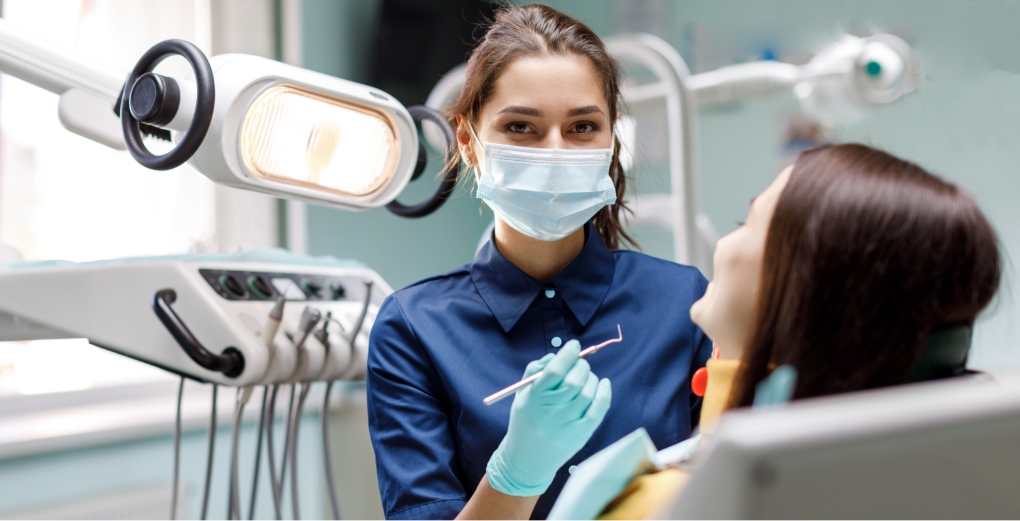Dental Exams
A dental exam is a comprehensive assessment of your oral health conducted by a qualified dentist or dental professional. It involves a thorough examination of your teeth, gums, mouth, and related structures to evaluate your oral health status and identify any potential issues or concerns.
Dental exams are typically recommended on a regular basis, usually every six months, although the frequency may vary based on individual needs and risk factors.
Purpose of Dental Exams
Dental exams serve multiple purposes, all aimed at maintaining and promoting good oral health:
- Early Detection of Issues: Regular dental exams help in identifying dental problems at an early stage, such as cavities, gum disease, oral infections, and even oral cancer. Early detection allows for prompt intervention and minimizes the severity of potential dental issues.
- Preventive Care: Dental exams play a vital role in preventive dental care. Dentists can identify risk factors or behaviors that might lead to dental problems in the future. By addressing these concerns, dentists can help you establish healthy oral hygiene practices and reduce the likelihood of developing dental issues.
- Assessment of Oral Hygiene: Dental exams provide an opportunity for dental professionals to assess your oral hygiene routine and offer guidance on proper brushing, flossing, and overall oral care techniques.
- Treatment Planning: If any dental problems are detected during the exam, your dentist can develop a personalized treatment plan to address the issues. This could include dental fillings, cleanings, gum treatments, or even referrals to specialists for more complex procedures.
- Monitoring Oral Health: For patients with pre-existing dental conditions, regular exams help monitor the progress of treatments and ensure that the conditions are being managed effectively.
Importance of Dental Exams
Regular dental exams are crucial for several reasons:
- Preventive Maintenance: Dental problems often start small and gradually worsen over time. Regular exams can catch these issues early, allowing for less invasive and costly treatments.
- Oral Cancer Detection: Oral cancer can be life-threatening if not detected and treated in its early stages. Dentists are trained to recognize the signs of oral cancer during routine exams.
- Gum Disease Prevention: Gum disease, if left untreated, can lead to tooth loss and other health issues. Regular exams help identify and address gum disease before it progresses.
- Personalized Advice: Dentists can provide tailored advice for maintaining good oral hygiene and making positive lifestyle changes that benefit your oral health.
- Overall Health Connection: Your oral health is connected to your overall health. Dental exams can sometimes reveal signs of systemic conditions such as diabetes or vitamin deficiencies.
Process of a Dental Exam
A typical dental exam consists of the following steps:
- Medical History Review: Your dentist will review your medical history, including any medications you’re taking or medical conditions you have. This information can impact your oral health.
- Visual Examination: The dentist will visually inspect your mouth, teeth, and gums for signs of decay, cavities, gum disease, and oral cancer. They will also look for any abnormalities in your bite or jaw alignment.
- X-rays: X-rays may be taken to reveal hidden dental issues, such as cavities between teeth, impacted teeth, or bone loss.
- Gum Evaluation: The health of your gums is crucial. The dentist will measure the depth of the spaces between your teeth and gums (pocket depth) to assess gum health.
- Professional Cleaning: A dental hygienist will perform a thorough cleaning, removing plaque and tartar buildup that regular brushing and flossing can’t eliminate.
- Discussion and Treatment Plan: If any issues are identified, the dentist will discuss the findings with you. They’ll explain the recommended treatments, their urgency, and the associated costs.
- Oral Hygiene Guidance: The dentist or hygienist will offer advice on improving your oral hygiene routine and may recommend specific oral care products.
- Next Appointment: Based on the findings, a schedule for future dental appointments will be recommended, typically every six months.
Preparing for a Dental Exam
Preparing for a dental exam is relatively straightforward:
- Gather Information: Make a list of any medications you’re taking, medical conditions you have, and any changes in your oral health or discomfort you’ve experienced since your last visit.
- Previous Dental Records: If you’re visiting a new dentist, it’s helpful to bring any previous dental records or X-rays, if available. This can provide a comprehensive view of your oral health history.
- Brush and Floss: While it’s not necessary to “clean up” before a dental exam, maintaining your regular oral hygiene routine by brushing and flossing is a good practice.
- Questions and Concerns: Prepare any questions or concerns you have about your oral health, dental treatments, or specific symptoms. This can help ensure that you have a productive conversation with your dentist.
Potential Risks of Dental Exams
Dental exams are generally safe and non-invasive. However, there are a few minor risks to consider:
- X-ray Exposure: Dental X-rays involve a small amount of radiation, but the risk is minimal. Dentists take precautions to minimize exposure, such as using lead aprons and only taking X-rays when necessary.
- Discomfort: Some people might experience minor discomfort during the exam, particularly if there are sensitive areas in your mouth. Inform your dentist if you have any concerns, and they can adjust their approach accordingly.
- Gag Reflex: Some patients have a sensitive gag reflex, which might be triggered during certain parts of the exam. Inform your dentist if you have a strong gag reflex so they can take steps to make you more comfortable.
Interpreting Dental Exam Results
The results of a dental exam will vary based on your individual oral health status. The dentist will communicate their findings to you, which may include:
- Healthy Teeth and Gums: If no issues are identified, the dentist will confirm that your teeth and gums are in good health and provide guidance for maintaining your oral hygiene.
- Cavities: If cavities are detected, the dentist will discuss treatment options, which may include dental fillings.
- Gum Disease: If signs of gum disease are present, the dentist may recommend treatments such as scaling and root planing or provide guidance on improving your oral hygiene routine.
- Oral Cancer: If any suspicious lesions are found, the dentist might recommend further tests or a referral to a specialist for a more thorough evaluation.
- Other Issues: The dentist will discuss any other issues they’ve identified, such as impacted teeth, bite problems, or signs of teeth grinding.
Commitment to Your Smile
Our dedication lies in assisting you to preserve your beautiful smile. We are fully committed to providing the utmost care and attention to your oral health needs. Through our professional expertise and personalized approach, we aim to ensure that your smile remains vibrant and healthy.
Recommended Frequency of Dental Exams
Regular dental exams are an essential component of maintaining optimal oral health. We recommend scheduling dental exams on a routine basis, generally every six months. This regularity allows us to monitor your oral health consistently and catch any potential issues at an early stage. However, the frequency of exams might be adjusted based on your individual needs and risk factors.
Our team of skilled dental professionals will work closely with you to determine the most appropriate exam schedule tailored to your unique oral health requirements. By following a consistent exam schedule, you contribute significantly to the long-term health and radiance of your smile.
Experience Our Concierge Service
Elevate your dental experience, we believe that your comfort and convenience are of utmost importance. Our Dental Exam service is designed to provide you with a seamless and luxurious dental visit.
From the moment you step into our practice, you’ll be met with personalized attention and a range of amenities aimed at enhancing your comfort. Our dedicated concierge team will assist you with appointment scheduling, inquiries, and any special requests you may have. We understand that dental visits can sometimes be associated with apprehension, which is why our concierge service is dedicated to creating a calming and soothing atmosphere.
Feel free to reach out to us to learn more about our Dental Exam procedure and how we can enhance your dental visits with a touch of luxury and comfort. Your smile deserves the finest care, and our concierge service is here to provide just that.
Find a location


